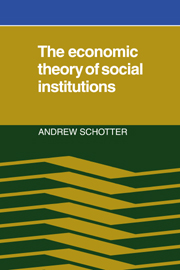Book contents
4 - Information and social institutions
Published online by Cambridge University Press: 05 November 2011
Summary
At this point in our discussion we have defined the type of problem whose solution requires the creation of a social institution and have discussed the actual process of institution creation by depicting it as a Markovian diffusion process whose absorbing points corresond to stable social institutions. This discussion has begged some very important questions: What function do social and economic institutions serve that could not be fulfilled in their absence? Exactly why are they efficient, if indeed they ever are?
The answer that we give is simple. Social and economic institutions are informational devices that supplement the informational content of economic systems when competitive prices do not carry sufficient information to totally decentralize and coordinate economic activities. More precisely, we see that although prices convey information concerning the relative scarcity of social resources and thereby create an incentive system for agents to economize, social institutions convey information about the expected actions of other agents when these actions are not perfectly coordinated by prices and consequently create incentives for such coordinated activity. In addition, we see that institutions tend to “codify memory” for the agents in the economy and thereby transform the game they are playing from a game of imperfect recall into one that has what we will call institution-assisted perfect recall. This transformation allows a considerable amount of informational efficiency, in that it permits the agents in the economy to employ stationary behavioral strategies in their play of the game and such strategies are highly efficient informationally. This will be accomplished by referring to a simple model of a two-person two-good Edge-worth barter economy.
- Type
- Chapter
- Information
- The Economic Theory of Social Institutions , pp. 109 - 143Publisher: Cambridge University PressPrint publication year: 1981
- 5
- Cited by



